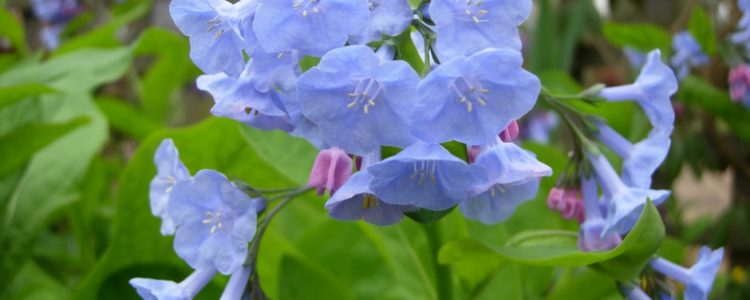Virginia Bluebell, Mertensia virginica, is my favorite spring ephemeral. It covers low lying woodlands with a blue haze of color in April. It cheers on spring in our perennial gardens, and makes a perfect companion for my pink Narcissus. And then, like all good ephemerals, Mertensia goes dormant with little a trace by summer.
We are accustomed to seeing drifts of wildflowers come and go in the woodland but a midsummer void in the flower garden may not be as appreciated. Alas, there is a simple solution. Interplant Virginia Bluebells with late emerging perennials. My Mertensia coexist in a shade garden with hardy Begonia grandis. It is a mutual love affair. The Bluebells will go dormant just as the Begonias finally show us their leaves. The Bluebells mark the place where the Begonias will emerge and keeps busy gardeners from disturbing the delicate root systems. Likewise, the Begonias soon cover the yellowing Bluebell foliage and keep a low maintenance garden in flower until frost.
Other late emerging perennials you might want to partner Bluebells with include: Leadwort (Ceratostigma plumbaginoides) and Ferns for shade and Balloon Flower (Platycodon grandiflorus), Butterfly Weed (Asclepias tuberosa), False Indigo (Baptisia australis) and Hardy Hibiscus for sunny gardens.
Bluebells grow 1 ½ to 2 feet tall, prefer shade to part shade light, and thrive in moist, loamy soil though my Mertensia only get necessary hand watering are in a part shade to sunny location, and do just fine. They are native throughout the mid west and east coast of the U.S. and parts of Canada. They will reseed like gentlemen and not like noxious weeds so I tip my hat to their self restraint. Hardy Begonias mimic this behavior and so they are a cherished and welcomed immigrant. If you have ever tried growing plants in the neighborhood of a Black Walnut tree you would know what a tiresome task it is to find plants tolerant of the toxic Juglone root system. Both Bluebells and Hardy Begonias will grow here.
If this sounds too good to believe, believe it. Virginia Bluebells are the perfect native plant to add to your garden or woodland.
